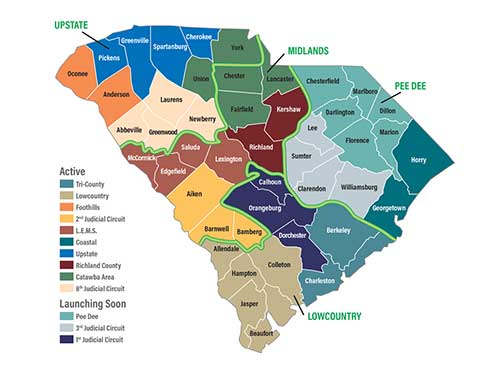Monique Garvin knows how critically important her work is in combating various forms of abuse in South Carolina’s communities and acutely recognizes the impact violence has on individuals.
As deputy director of the Violence Against Women Act Program and South Carolina Human Trafficking Task Force at the South Carolina Attorney General’s Office, her goal is to prevent trauma and abuse and to minimize its consequences. Her efforts are statewide and primarily focused on domestic violence, human trafficking, sexual assault, stalking and harassment
The University of South Carolina graduate (’19 dual master’s, social work and public administration) came to her current position with nearly a decade of professional experience in education, policy work, mental health services, program development and research.
A native of Greenville, Garvin completed her undergraduate degree in political science at Winthrop University then joined Teach for America. She recalls her experience teaching in Clarendon and Colleton counties as being transformative.
“One of my students died by suicide," Garvin says. "That was really a challenging moment for me in my early 20s, and I didn’t feel I had the skills to adequately support my students.”
She left the classroom to pursue her master’s degree at USC. Although she previously worked at domestic violence shelters and with sexual assault survivors, Garvin wasn’t sure she wanted to continue in that field.
“Because of past experiences, that space didn’t feel safe for me,” she says.
She credits encouragement from social work professor Patrice Penney and an internship at a rape crisis center for changing the trajectory of her career plans.
“The emphasis on policy and community work as well as the clinical skills helped me find my niche in social work and as a public administrator,” Garvin says.
She joined the Attorney General’s Office as program coordinator for the Violence Against Women Act Program, then was promoted to deputy director and has been in her current rolefor about two and half years. To meet the goals of the grant-funded program, the director, deputy director, special prosecutor, program coordinator and program assistant collaborate to implement the statewide program. Its main goals are prosecuting cases of violence against women while also providing training and resources to victim advocates, law enforcement, prosecutors, judges, community members and other service providers. Much of these efforts are focused on the causes, consequences, intersectionalities and laws related to domestic violence and sexual assault crimes.

Garvin is also deputy director of the South Carolina Human Trafficking Task Force, legislatively mandated by the General Assembly in 2012. In addition to 11 member state agencies, the task force comprises multiple subcommittees and regional organizations that work to prevent crime, prosecute cases and protect victims.
“Although marginalized communities can be more vulnerable, trafficking can happen to anyone,” she says. “From a social work perspective, I think about it in terms of Maslow's hierarchy of needs, that includes basic things like food, shelter, love, belonging and safety. Traffickers look for opportunities to exploit those needs to build rapport and trust.”
The number of minors who are trafficked in South Carolina increases every year, Garvin says. In 2023, the State Law Enforcement Division reported 357 trafficking cases with 498 victims, 460 of which were minors. Forty of the state’s 46 counties had at least one trafficking case; nearly all are related to sex, labor or both. In 2022, the cases of labor trafficking increased over 400 percent. Traffickers are not limited to illicit recruiters, they often are employers, intimate partners or family members.
The state lacks adequate resources for those who are victimized, Garvin says. But in January, the task force will launch a program funded by $6.5 million appropriated by the General Assembly to open more shelters for victims who are minors.
In addition, a trafficking prevention education program was launched in fall 2023 in partnership with South Carolina Educational Television. TraffickProofSC is a four-part curriculum for high school students that uses videos and other training material to discuss sex trafficking, labor trafficking and the dangers of social media.
“Social media is such a huge recruitment method because you can talk to anyone anywhere, and people are so comfortable talking to strangers online,” Garvin says. “Those who recruit can spend days, weeks or months grooming. We want to prevent that from happening by helping students identify online red flags and learn how to protect themselves and seek help and resources.”
The TraffickProofSC series won a silver Telly Award for education and training, and the task force plans to develop partnerships with higher education for similar outreach and education.
“I was devastated to find out how prevalent human trafficking is in South Carolina and to find out the cases are increasing,” says Ginger Cassell, eLearning designer/producer/editor for SC ETV. “It can happen to anyone, anywhere, any socioeconomic background. Our youth are vulnerable and need to be able to identify red flags, evaluate situations and protect themselves.”
Another awareness initiative Garvin was responsible for when she was program coordinator for the Violence Against Women Act and continues to oversee in her current role is the annual Silent Witness Program. Held on the State House grounds, the October event honors victims in South Carolina who lost their lives as a result of domestic violence. This fall’s ceremony honored 29 women and seven men who were victims in 2023.

"My aspiration for our state is that we can create communities that are free from violence where everyone can thrive regardless of who they are or where they come from.”
Garvin calls domestic violence a public health crisis in South Carolina, but adds that the number of incidents can be difficult to capture because some groups are not represented in the legal definition of the crime.
“While we do have some data around what's happening in South Carolina, we know that the numbers are greater than we probably anticipate,” she says.
In a study published by the Violence Policy Center, South Carolina ranked in the top 10 states in the rate of females killed by males for 23 of the 25 years in the study (1996-2020). Tougher penalties are helping, but more prevention and victim services are needed, Garvin says, adding that the number of men dying as a result of domestic violence has also risen.
“I am a person who knows how it feels to not be safe, and I’ve seen the impact prevention education can have,” Garvin says. “My aspiration for our state is that we can create communities that are free from violence where everyone can thrive regardless of who they are or where they come from.”
If you need help
- Call the National Human Trafficking Hotline, (888) 373-7888, or text HELP to 233733.
- Call the National Domestic Violence Hotline, (800) 799-SAFE (7233), or text START to 88788.
- In case of an emergency, call 911.
